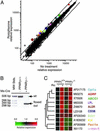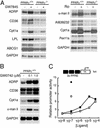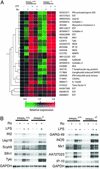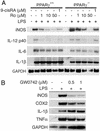PPARgamma and PPARdelta negatively regulate specific subsets of lipopolysaccharide and IFN-gamma target genes in macrophages
- PMID: 12740443
- PMCID: PMC164512
- DOI: 10.1073/pnas.1031789100
PPARgamma and PPARdelta negatively regulate specific subsets of lipopolysaccharide and IFN-gamma target genes in macrophages
Abstract
Natural and synthetic agonists of the peroxisome proliferator-activated receptor gamma (PPARgamma) regulate adipocyte differentiation, glucose homeostasis, and inflammatory responses. Although effects on adipogenesis and glucose metabolism are genetically linked to PPARgamma, the PPARgamma dependence of antiinflammatory responses of these substances is less clear. Here, we have used a combination of mRNA expression profiling and conditional disruption of the PPARgamma gene in mice to characterize programs of transcriptional activation and repression by PPARgamma agonists in elicited peritoneal macrophages. Natural and synthetic PPARgamma agonists, including the thiazolidinedione rosiglitazone (Ro), modestly induced the expression of a surprisingly small number of genes, several of which were also induced by a specific PPARdelta agonist. The majority of these genes encode proteins involved in lipid homeostasis. In contrast, Ro inhibited induction of broad subsets of lipopolysaccharide and IFN-gamma target genes in a gene-specific and PPARgamma-dependent manner. At high concentrations, Ro inhibited induction of lipopolysaccharide target genes in PPARgamma-deficient macrophages, at least in part by activating PPARdelta. These studies establish overlapping transactivation and transrepression functions of PPARgamma and PPARdelta in macrophages and suggest that a major transcriptional role of PPARgamma is negative regulation of specific subsets of genes that are activated by T helper 1 cytokines and pathogenic molecules that signal through pattern recognition receptors. These findings support a physiological role of PPARgamma in regulating both native and acquired immune responses.
Figures





Comment in
-
Suppression of macrophage inflammatory responses by PPARs.Proc Natl Acad Sci U S A. 2003 May 27;100(11):6295-6. doi: 10.1073/pnas.1232410100. Epub 2003 May 19. Proc Natl Acad Sci U S A. 2003. PMID: 12756292 Free PMC article. No abstract available.
Similar articles
-
Pro-inflammatory cytokines negatively regulate PPARγ mediated gene expression in both human and murine macrophages via multiple mechanisms.Immunobiology. 2013 Nov;218(11):1336-44. doi: 10.1016/j.imbio.2013.06.011. Epub 2013 Jul 1. Immunobiology. 2013. PMID: 23870825
-
The peroxisome proliferator-activated receptor beta/delta agonist, GW501516, regulates the expression of genes involved in lipid catabolism and energy uncoupling in skeletal muscle cells.Mol Endocrinol. 2003 Dec;17(12):2477-93. doi: 10.1210/me.2003-0151. Epub 2003 Oct 2. Mol Endocrinol. 2003. PMID: 14525954
-
The peroxisome proliferator-activated receptor N-terminal domain controls isotype-selective gene expression and adipogenesis.Mol Endocrinol. 2006 Jun;20(6):1261-75. doi: 10.1210/me.2006-0025. Epub 2006 Mar 23. Mol Endocrinol. 2006. PMID: 16556736
-
Peroxisome proliferator-activated receptor-gamma in macrophage lipid homeostasis.Trends Endocrinol Metab. 2002 Oct;13(8):331-5. doi: 10.1016/s1043-2760(02)00668-9. Trends Endocrinol Metab. 2002. PMID: 12217489 Review.
-
Peroxisome proliferator-activated receptors (PPARs): nuclear receptors at the crossroads between lipid metabolism and inflammation.Inflamm Res. 2000 Oct;49(10):497-505. doi: 10.1007/s000110050622. Inflamm Res. 2000. PMID: 11089900 Review.
Cited by
-
FABP7 upregulation induces a neurotoxic phenotype in astrocytes.Glia. 2020 Dec;68(12):2693-2704. doi: 10.1002/glia.23879. Epub 2020 Jul 3. Glia. 2020. PMID: 32619303 Free PMC article.
-
A novel antipyretic action of 15-deoxy-Delta12,14-prostaglandin J2 in the rat brain.J Neurosci. 2004 Feb 11;24(6):1312-8. doi: 10.1523/JNEUROSCI.3145-03.2004. J Neurosci. 2004. PMID: 14960602 Free PMC article.
-
Regulation of IkappaBalpha function and NF-kappaB signaling: AEBP1 is a novel proinflammatory mediator in macrophages.Mediators Inflamm. 2010;2010:823821. doi: 10.1155/2010/823821. Epub 2010 Apr 12. Mediators Inflamm. 2010. PMID: 20396415 Free PMC article. Review.
-
Serum PPARγ level and PPARγ gene polymorphism as well as severity and prognosis of brain injury in patients with arteriosclotic cerebral infarction.Exp Ther Med. 2018 Nov;16(5):4058-4062. doi: 10.3892/etm.2018.6660. Epub 2018 Aug 28. Exp Ther Med. 2018. PMID: 30344683 Free PMC article.
-
Increased CD36 protein as a response to defective insulin signaling in macrophages.J Clin Invest. 2004 Mar;113(5):764-73. doi: 10.1172/JCI19528. J Clin Invest. 2004. PMID: 14991075 Free PMC article.
References
-
- Willson, T. M., Lambert, M. H. & Kliewer, S. A. (2001) Annu. Rev. Biochem. 70, 341–367. - PubMed
-
- Chawla, A., Repa, J., Evans, R. & Mangelsdorf, D. (2001) Science 294, 1866–1870. - PubMed
-
- Spiegelman, B. M. (1998) Diabetes 47, 507–514. - PubMed
-
- Xu, H. E., Lambert, M. H., Montana, V. G., Parks, D. J., Blanchard, S. G., Brown, P. J., Sternbach, D. D., Lehmann, J. M., Wisely, G. B., Willson, T. M., et al. (1999) Mol. Cell 3, 397–403. - PubMed
-
- Forman, B. M., Tontonoz, P., Chen, J., Brun, R. P., Spiegelman, B. M. & Evans, R. M. (1995) Cell 83, 803–812. - PubMed
Publication types
MeSH terms
Substances
Grants and funding
LinkOut - more resources
Full Text Sources
Other Literature Sources
Molecular Biology Databases
Research Materials

